Comparing F3 and F4 Fibrosis With Jennifer Geremia
Chat with MASLD AI

Hi, I am MASLD AI.
Suggested Questions :

MASLD AI 04:11 AM

In this GHAPP MASLD Community Network session, Jennifer Geremia, PA-C from Boston, discusses the critical differences between F3 fibrosis and F4 cirrhosis in patients with MASLD (Metabolic Associated Steatotic Liver Disease) and MASH (Metabolic Associated Steatohepatitis). Using a detailed case study, she outlines how non-invasive tests (NITs) such as FIB-4, FibroScan, CAP score, and ELF testing can help differentiate fibrosis stages and guide patient management. The discussion highlights when to consider advanced testing, the role of resmetirom (Rezdiffra) in eligible F2–F3 patients, and why treatment strategies differ for those with F4 cirrhosis, including the need for HCC surveillance, portal hypertension evaluation, and variceal screening. Jennifer also emphasizes lifestyle modifications, metabolic risk factor control, and multidisciplinary care as essential components of managing advanced liver disease. This presentation provides valuable insights for GI, hepatology, and primary care providers navigating the nuances of fibrosis staging and treatment decisions in 2025.
Related Podcast
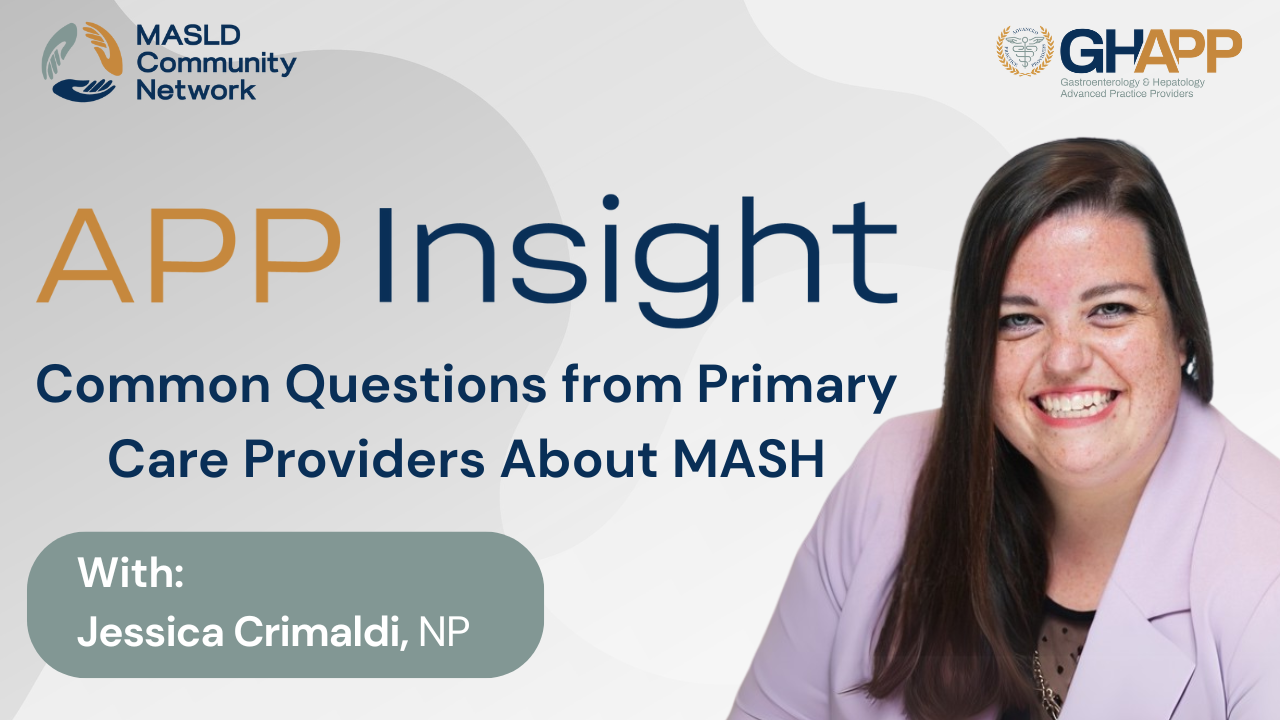
Common Questions From Primary Care Providers About MASH

In this insightful episode, Jessica Crimaldi, NP from the Cleveland Clinic, addresses two of the most frequently asked questions from primary care providers about MASLD (Metabolic dysfunction-associated steatotic liver disease) and MASH (Metabolic-associated steatohepatitis). First, she clarifies a common concern regarding statin use in patients with liver disease, emphasizing that statins are not only safe in most cases—including compensated cirrhosis—but also beneficial in managing cardiometabolic risk factors and slowing disease progression. She explains when statins are contraindicated and encourages collaboration with hepatology if there are concerns. Second, Jessica outlines a practical pre-referral workup for suspected MASLD/MASH patients. She details the labs needed to calculate FIB-4, suggests ordering an INR, and highlights the importance of screening for viral hepatitis, autoimmune liver disease, and common genetic liver disorders. This episode offers clear, actionable guidance for providers managing fatty liver disease in primary care and is a valuable resource for improving early diagnosis and coordinated care.
Watch Now
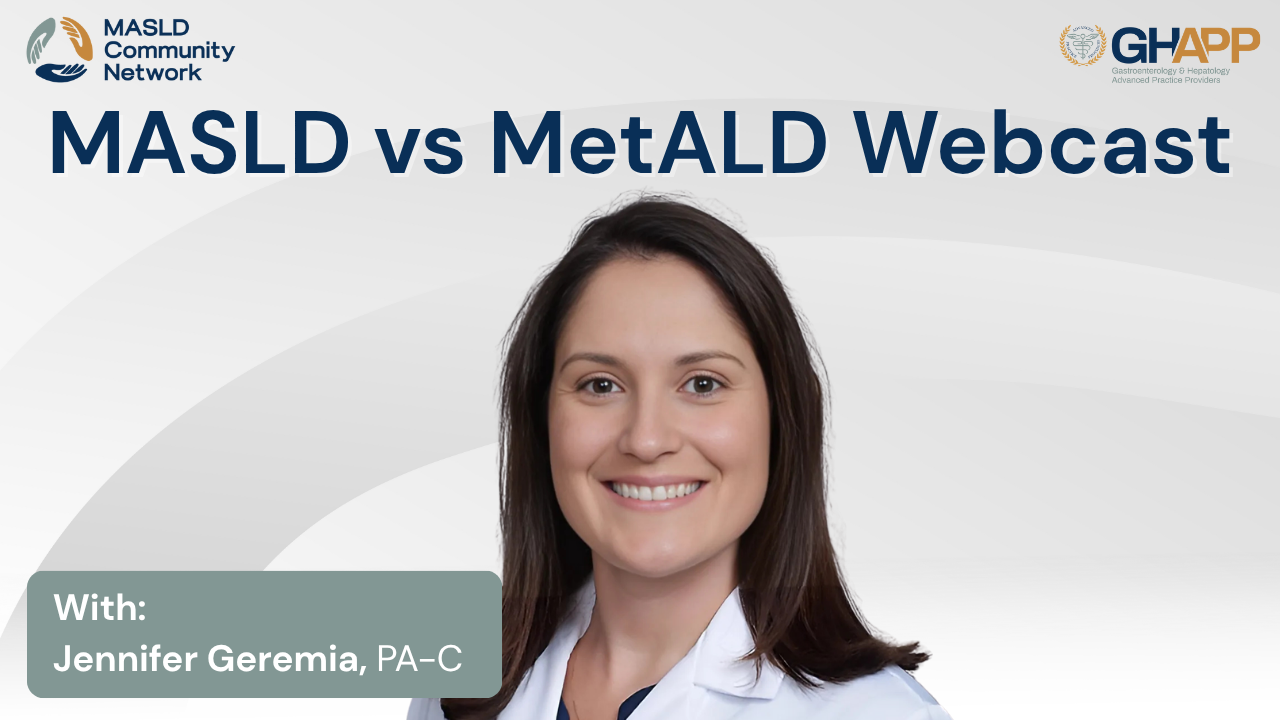
MASLD vs MetALD With Jennifer Geremia

In this GHAPP MASLD Community Network presentation, Jennifer Geremia, PA-C explains how to differentiate metabolic dysfunction–associated steatotic liver disease (MASLD) from metabolic dysfunction plus alcohol-associated liver disease (MetALD) and how to manage patients who sit on the MASLD–MetALD spectrum. Using a classic case (52-year-old with BMI 29.4, PCOS, hypertension, hyperlipidemia, ultrasound-confirmed steatosis, FibroScan 11.4 kPa [F3] and CAP 310), she shows how to combine history, “standard drink” counseling, AUDIT-C screening, and objective biomarkers like PEth to uncover under-reported alcohol use, quantify grams/day or week, and classify risk. You’ll learn practical algorithms for ruling out alternative etiologies, assessing cardiometabolic drivers, interpreting noninvasive tests, and estimating 5-year decompensation risk across MASLD, MetALD, and ALD. The session closes with actionable care steps: lifestyle and Mediterranean-style nutrition, exercise and weight-loss targets, strict alcohol cessation (and referral when appropriate), consideration of pharmacologic options in advanced fibrosis, and when to initiate HCC surveillance. Scan the QR code to confirm attendance and access more MASLD/MetALD education and resources.
Watch Now
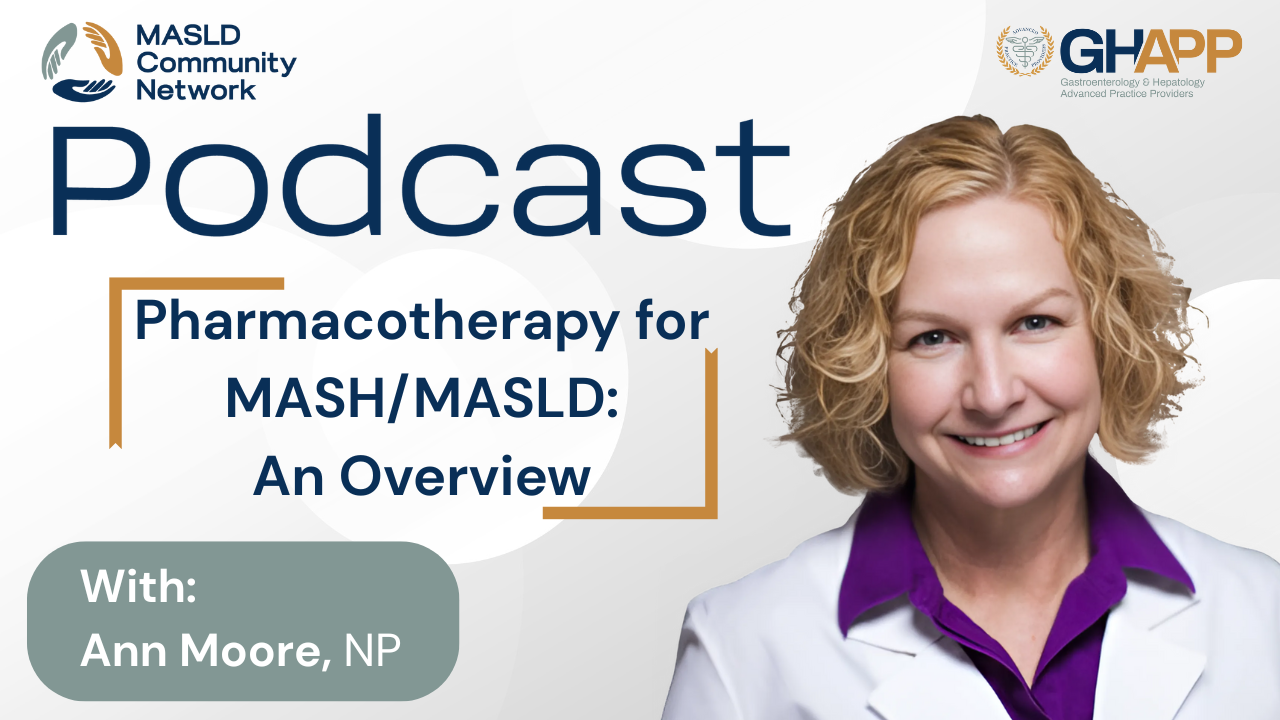
Pharmacotherapy for MASH/MASLD: An Overview

In this expert discussion, Anne Moore, NP with Arizona Liver Health in Phoenix, shares key insights into the evolving landscape of pharmacotherapy for MASH and MASLD. She explains the primary histological endpoints that matter most in clinical trials—MASH resolution and fibrosis improvement—and why these markers are critical for both regulatory approval and long-term patient outcomes. Anne highlights the approval of resmetirom, the first FDA-approved treatment for MASH with F2–F3 fibrosis, and reviews how it works as a selective THR-beta agonist to reduce liver fat and inflammation while improving fibrosis. Drawing on Phase 3 trial data, she outlines its efficacy, safety profile, and side effects, as well as strategies for monitoring patients through non-invasive testing, liver chemistries, and metabolic risk factors. This session also explores which patients are most appropriate candidates for MASH pharmacotherapy, with a focus on those at high risk of progression but still early enough in their disease to benefit. For advanced practice providers and hepatology specialists, this video provides a clear, practical roadmap to identifying, treating, and monitoring patients with MASH in everyday clinical practice.
Watch Now
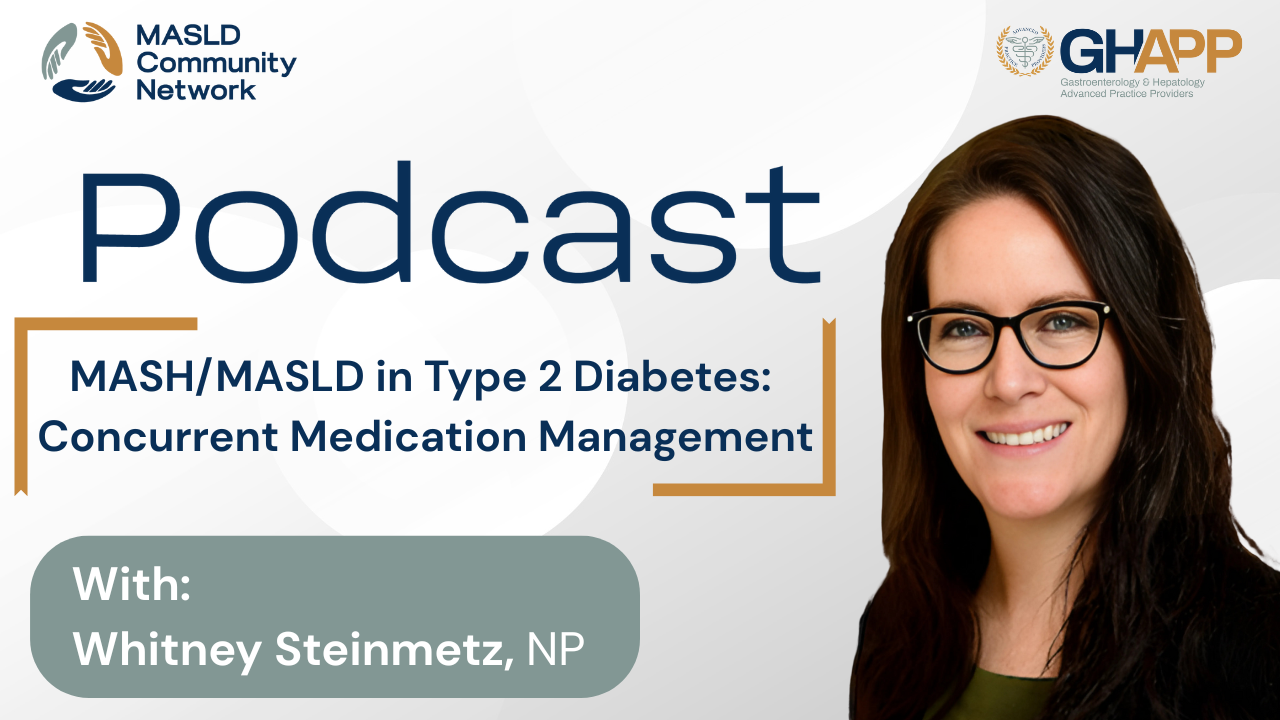
MASH/MASLD in Type 2 Diabetes: Concurrent Medication Management

In this informative episode, Whitney Steinmetz, NP from Presbyterian Medical Group in Albuquerque, NM, explores how to optimize medication strategies for patients with type 2 diabetes who are also living with MASLD and MASH. She discusses why individuals with type 2 diabetes are at significantly higher risk for developing advanced liver fibrosis—highlighting the overlapping metabolic, inflammatory, and insulin-resistant pathways that accelerate liver damage. Whitney breaks down how commonly prescribed diabetes medications—like GLP-1 receptor agonists, SGLT2 inhibitors, TZDs, and dual/triple incretins—impact liver fat, inflammation, and fibrosis progression. She offers practical guidance on selecting therapies that balance glycemic control with hepatic benefits while minimizing polypharmacy. Learn which medications may offer dual cardiometabolic and hepatic advantages, and which should be avoided or used with caution in patients with cirrhosis or advanced fibrosis. Tune in for real-world insights into how advanced practice providers can take ownership of MASH management in diabetes care.
Watch Now
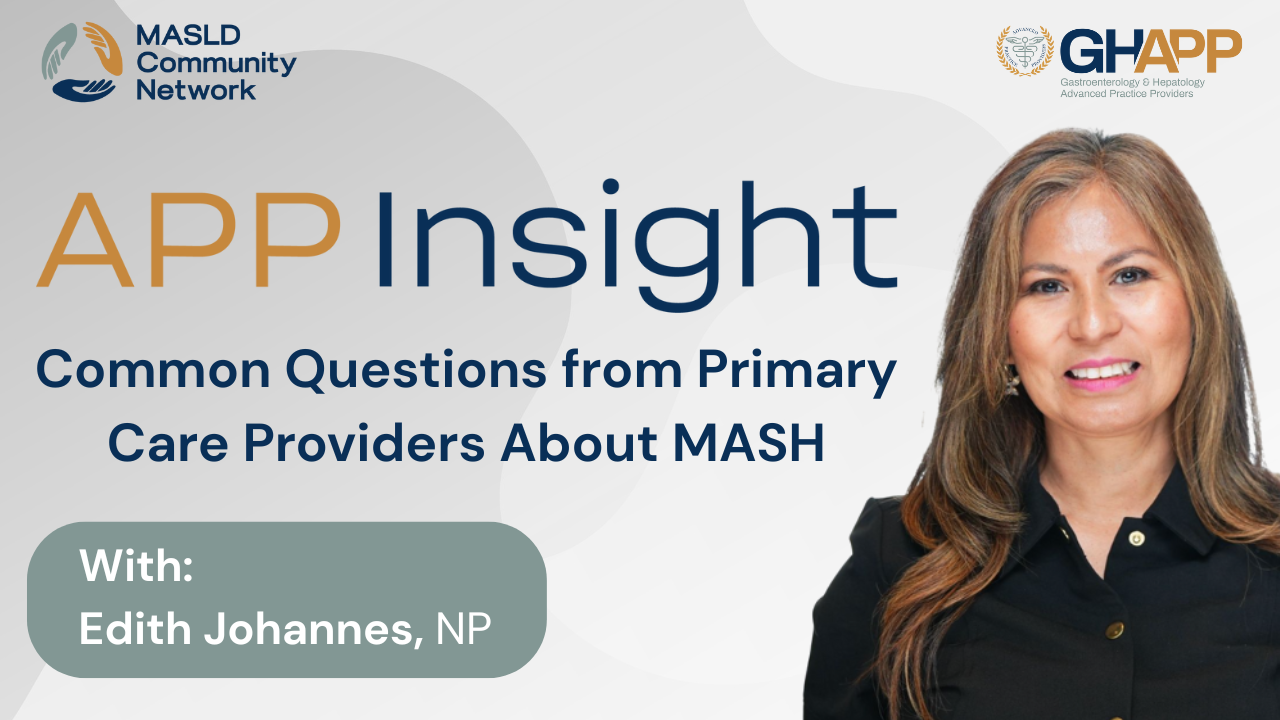
Common Questions From Primary Care Providers About MASH

In this MASLD Community Network episode, Edith Johannes, NP at UCLA Health, shares evidence-based guidance on one of the most important questions in managing Metabolic Dysfunction–Associated Steatotic Liver Disease (MASLD) and Metabolic Dysfunction–Associated Steatohepatitis (MASH): how much weight loss is needed to improve liver health. Drawing on years of experience in hepatology and liver transplant care, Edith explains how weight loss can reduce liver fat (steatosis), decrease inflammation, improve or even reverse fibrosis, and support better overall metabolic health. Research shows that achieving more than 10% weight loss can result in 100% improvement in steatosis, MASH resolution in 90% of patients, and fibrosis regression in over 80%. Even smaller amounts of weight loss—5% to 10%—provide significant liver and metabolic benefits, while exercise and dietary changes can help improve liver function even without weight loss. Edith also discusses when additional treatments like GLP-1s, bariatric surgery, or resmetirom may be needed. This video is essential for healthcare providers, patients, and caregivers seeking practical, science-backed strategies to manage MASLD and MASH effectively.
Watch Now
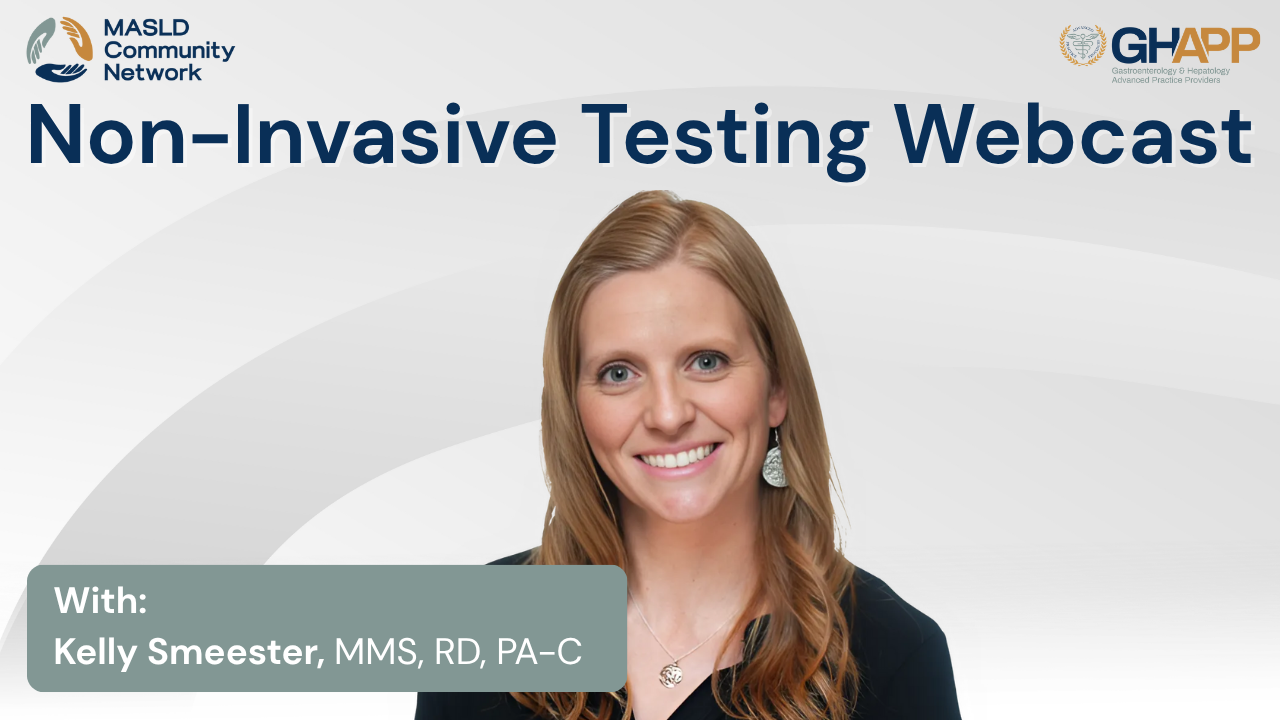
Non-Invasive Testing With Kelly Smeester

Join Kelly Smeester, MMS, RD, PA-C, from South Denver Gastroenterology, for an in-depth discussion on the latest tools and strategies in non-invasive liver disease assessment, presented through the GHAPP MASLD Community Network. This evidence-based session walks viewers through a case study of a patient with Metabolic Dysfunction-Associated Steatotic Liver Disease (MASLD) and explores the full range of non-invasive testing modalities used to evaluate liver fat, stiffness, and fibrosis risk. Kelly breaks down the utility of key tests including FIB-4, ELF Score, FibroScan (VCTE), and MR Elastography, and compares their accuracy, accessibility, limitations, and clinical value. Learn how to interpret biomarkers such as CAP (Controlled Attenuation Parameter) and kPa (Kilopascals), how to navigate indeterminate FIB-4 results, and when to escalate to more advanced imaging like MRE. The session also provides insights into combined scoring models (FAST, MAST, MEFIB), real-world use cases, and how comorbidities and patient-specific factors (BMI, ALT, bilirubin, ascites) can impact test reliability. Whether you're managing early-stage fatty liver disease or advanced fibrosis, this session provides essential knowledge to guide accurate diagnosis, risk stratification, and long-term monitoring without a liver biopsy.
Watch Now
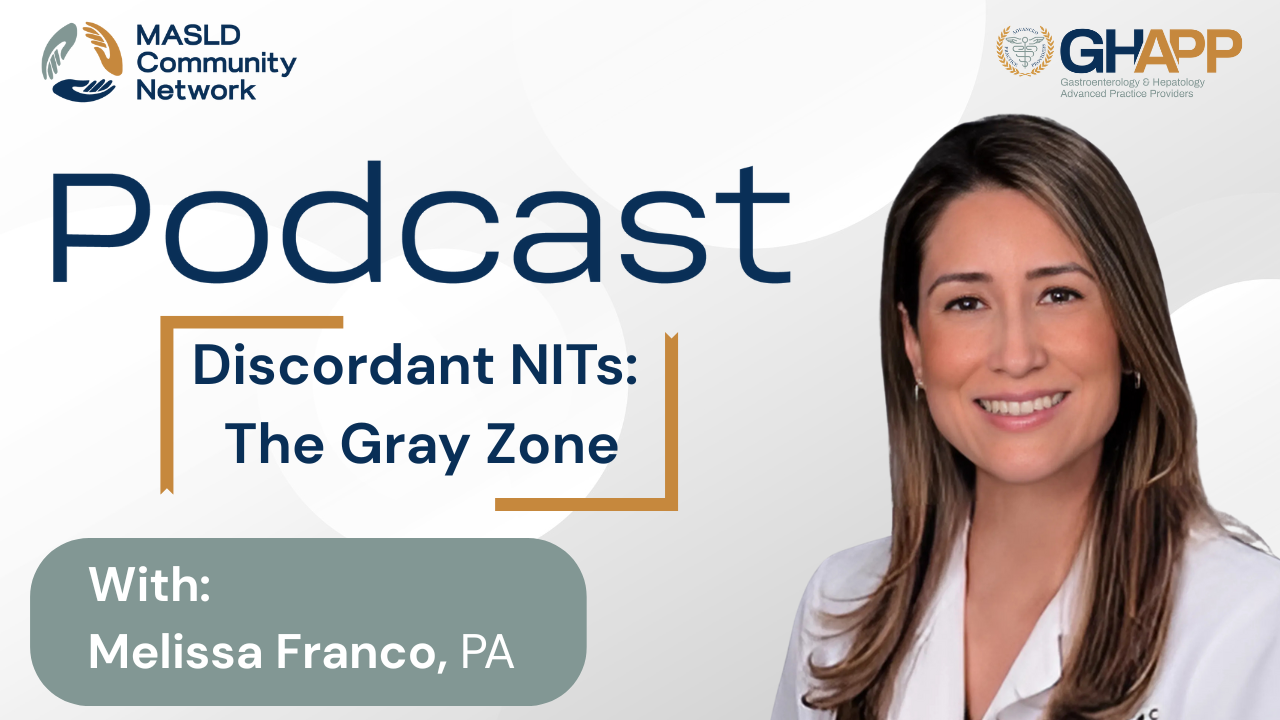
Discordant NITs: The Gray Zone

Join Melissa Franco, PA at the University of Miami, for an in-depth episode of the GHAPP MASLD Community Network podcast focused on discordant non-invasive tests (NITs) and navigating the "gray zone" of liver fibrosis staging. Melissa walks through common real-world scenarios where FIB-4, FibroScan, ultrasound, ELF score, and MR elastography deliver conflicting results—exploring why this happens and how to approach it clinically. Learn how patient factors such as obesity, alcohol use, co-morbidities, medications, and test limitations can impact NIT interpretation. Discover Melissa’s expert strategies for re-evaluating results, when to consider liver biopsy, and how to communicate these complexities with patients. From understanding how false elevations occur to using imaging and labs to confirm or exclude advanced fibrosis, this episode provides a practical and evidence-based approach to staging MASLD and MASH when results don’t align. Whether you're managing metabolic liver disease in hepatology or primary care, this is essential listening for interpreting liver diagnostics in nuanced clinical settings.
Watch Now
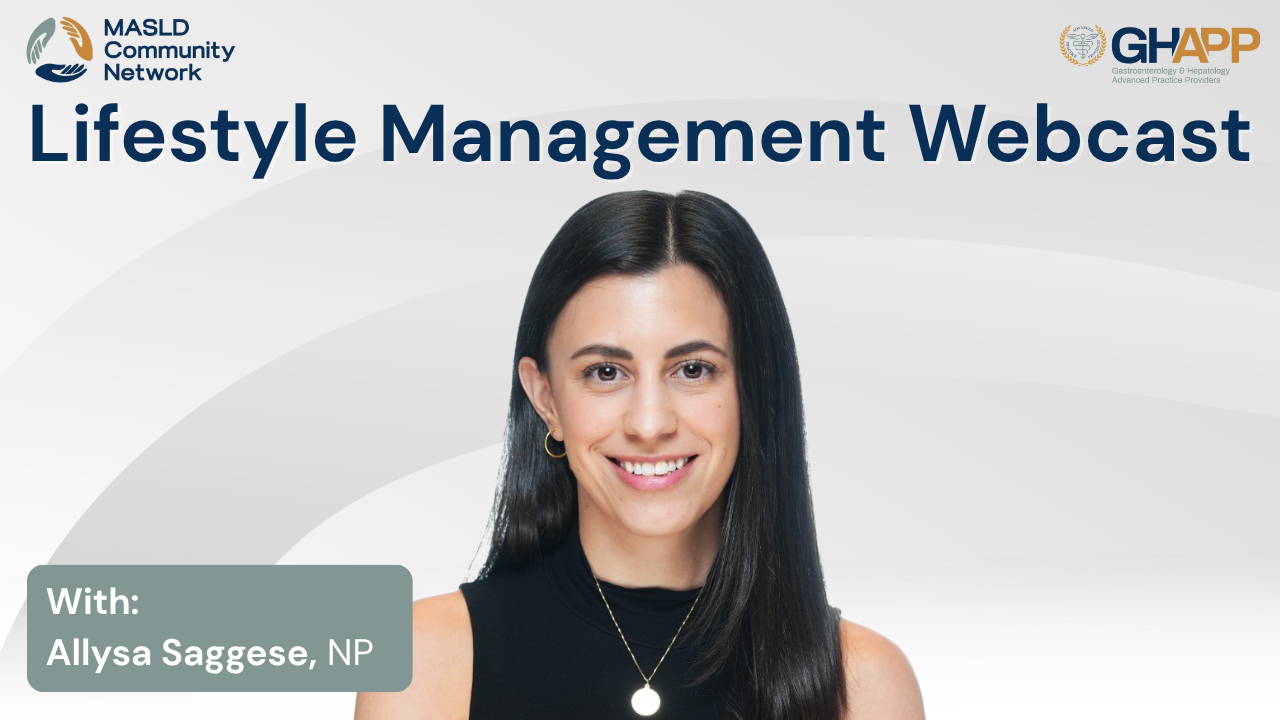
Lifestyle Management With Allysa Saggese

Join Allysa Saggese, NP, from Weill Cornell Medicine in New York City, for an insightful and practical discussion on lifestyle management for MASLD and MASH, presented through the GHAPP MASLD/MASH Community Network, sponsored by Madrigal Pharmaceuticals. In this case-based presentation, Allysa walks viewers through the non-pharmacologic strategies used to manage Metabolic Dysfunction-Associated Steatotic Liver Disease (MASLD), highlighting the role of nutrition, physical activity, and patient-centered counseling. Using a real-world example of a 65-year-old patient with obesity, diabetes, and steatosis, Allysa demonstrates how to assess fibrosis risk through non-invasive testing like FIB-4 and FibroScan, and explains how lifestyle modifications remain central to slowing disease progression—even in the era of advanced therapeutics. The session explores the importance of motivational interviewing, cultural dietary preferences, and how to structure effective, individualized conversations around reducing sugar intake, increasing movement at home, and achieving sustainable 5–10% weight loss to improve liver histology. Allysa also breaks down the metabolic interplay between central adiposity, insulin resistance, and liver inflammation, and shares counseling tips to build patient trust and long-term engagement. Whether you're a GI or hepatology provider, this session delivers real-world guidance to help empower patients to reverse early liver damage through everyday lifestyle changes.
Watch Now
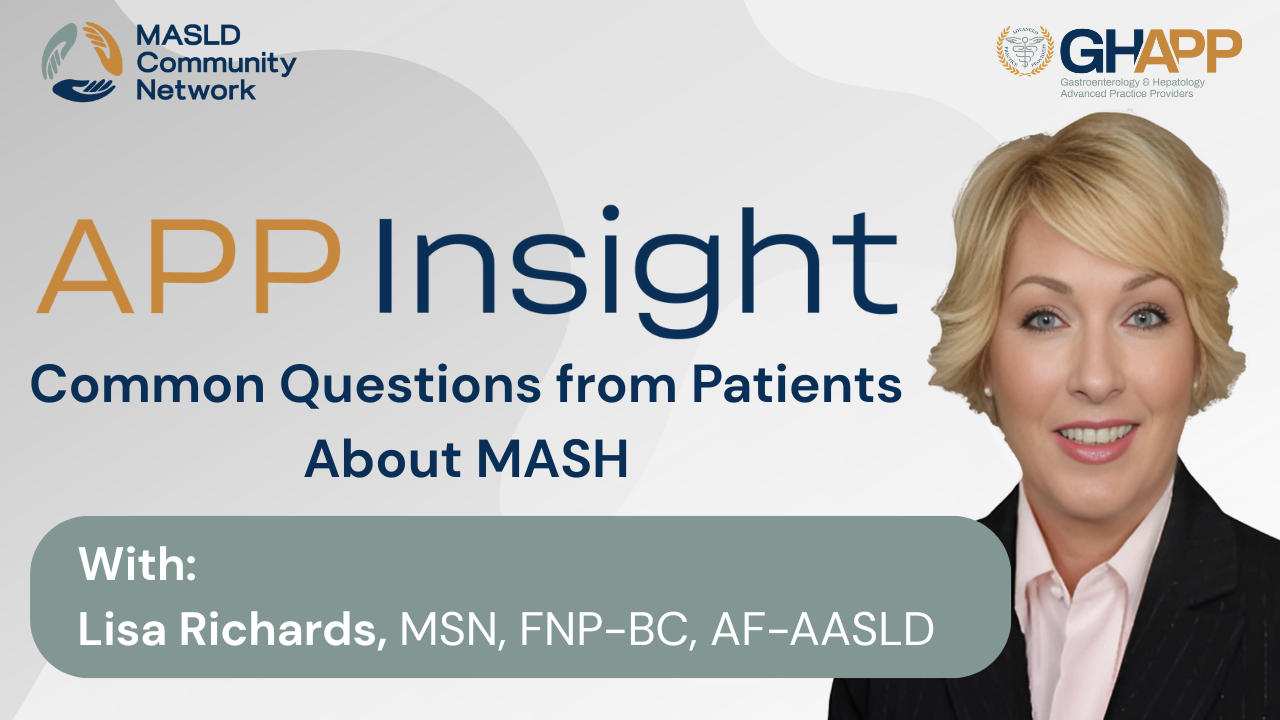
Common Questions From Patients About MASH

In this practical and patient-focused discussion from the GHAPP MASLD/MASH Community Network, we address some of the most frequently asked questions by patients newly diagnosed with MASLD (Metabolic dysfunction-associated steatotic liver disease). Many patients wonder how they can have liver disease if they don’t drink alcohol. This video explains the evolution from NAFLD to MASLD, emphasizing that MASLD is rooted in metabolic risk factors—not alcohol use—and commonly affects individuals with diabetes, obesity, and hypertension. Viewers will also learn about evidence-based lifestyle interventions, including the benefits of a hypocaloric diet, the recommended Mediterranean-style eating pattern, and 150 minutes of weekly physical activity. Finally, we tackle the question “Is MASLD curable?” with empowering guidance on how weight loss and exercise can help reverse liver damage and reduce liver fat. This is a must-watch for clinicians, care teams, and patients seeking clarity and confidence in managing this increasingly common liver disease.
Watch Now
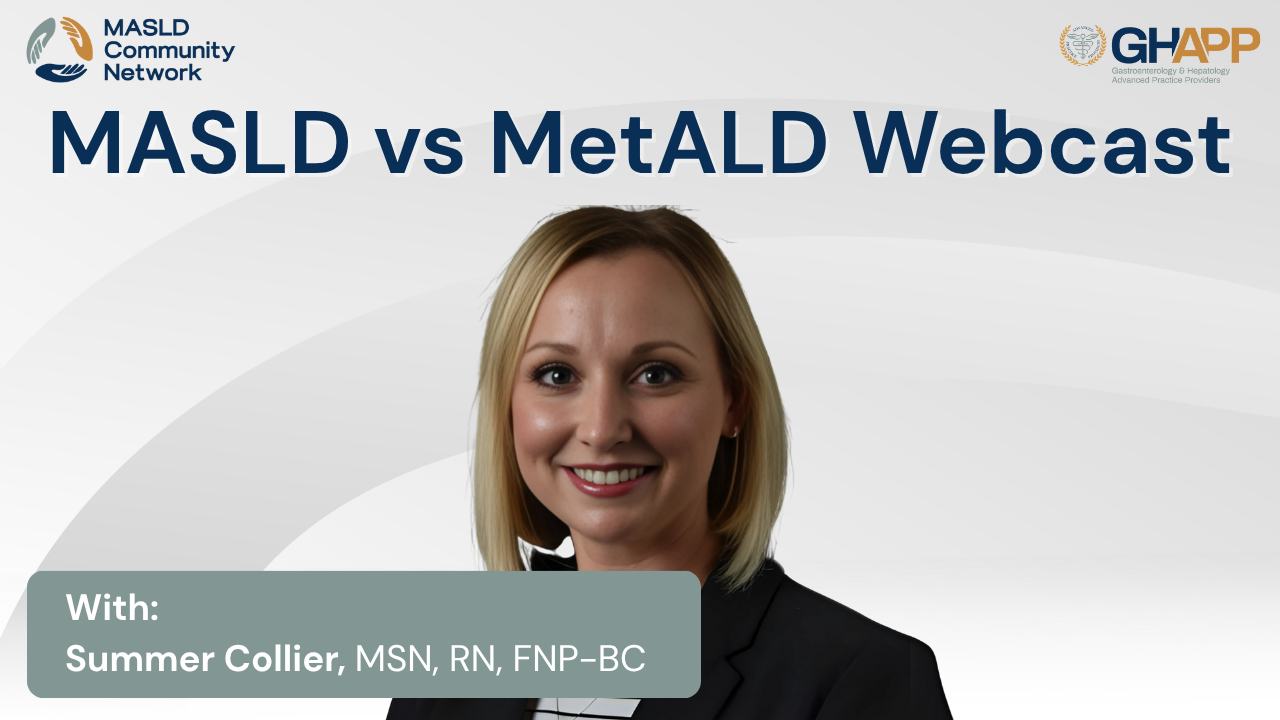
MASLD vs MetALD With Summer Collier

In this educational session from the GHAPP MASLD Community Network, Summer Collier, NP at UC San Diego Health, explores the overlap between metabolic dysfunction–associated steatotic liver disease (MASLD) and metabolic dysfunction plus alcohol-associated liver disease (MetALD) through a detailed clinical case study. Using real-world patient data, she highlights key considerations for evaluating, diagnosing, and managing steatotic liver disease, with special focus on teasing out the dual drivers of metabolic risk factors and alcohol consumption. Viewers will learn about diagnostic tools such as FibroScan, CAP scores, and PEth testing, and how these objective biomarkers help distinguish true MASLD from alcohol-driven disease. The discussion also covers pathophysiology, risk of fibrosis progression, patient counseling on lifestyle and alcohol cessation, current treatment recommendations, and hepatocellular carcinoma (HCC) screening in advanced fibrosis. Whether you are a hepatology provider, APP, or clinician interested in MASLD and MetALD, this session provides practical insights into patient education, disease classification, and the importance of standardized definitions for clinical care and research.
Watch Now





 August 2025
August 2025 